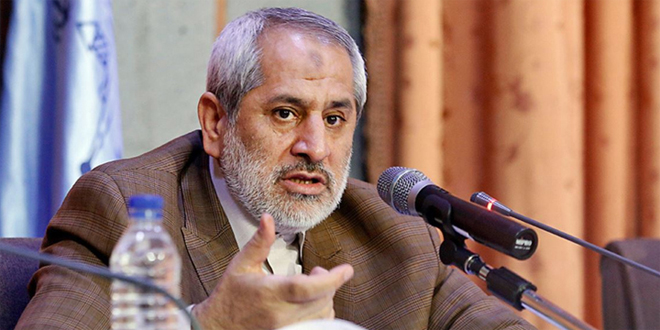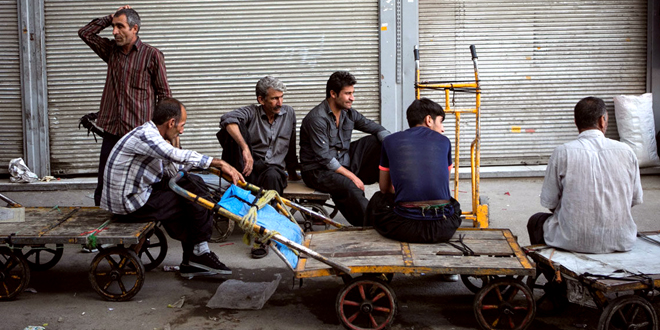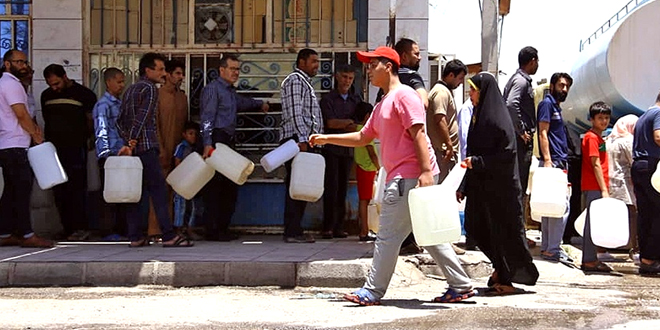
We begin tonight’s edition of A Window to the Fatherland with Dr. Alireza Nourizadeh reading one of his poems from the book of his collected works.
Read More »

We begin tonight’s edition of A Window to the Fatherland with Dr. Alireza Nourizadeh reading one of his poems from the book of his collected works.
Read More »

Jamshid Chalangi:
In tonight’s program of Behind the Headlines:
Was Iran, as the current regime claims, under the domination of a foreign country?
Does isolating Iran mean that we are now an independent country?
What role the regime’s atomic program has played in the imposition of US sanctions?
We discuss these topics with our guest, Hassan Mansour and Namdar Baghaie Yazdi.
Read More »

We begin tonight’s edition of A Window to the Fatherland with Dr. Alireza Nourizadeh reading one of his poems from the book of his collected works.
Read More »

by: Samer al-Atrush
The Iranian government has come under further strain in the wake of the axed nuclear deal, as economic sanctions begin to bite and protests begin to surge once again.
Showing that they still have the clout to unsettle the government, as they did in 1978 when they backed the Islamic Revolution that dethroned the Shah, merchants beneath the vaulted domes of Tehran’s Grand Bazaar last week began shutting their stalls in a protest that lasted for three days.
Though no longer the economic centre of Tehran, the sprawling bazaar still resonates with symbolism.
The question now is how long Hassan Rouhani, the Iranian president, will last while he’s being pressed by hardliners at home and facing renewed US sanctions abroad.
The hardliners, who have attacked Mr Rouhani since the pragmatist first won elections in 2013, have been blamed for instigating the strike, and have sought to exploit it.
They oppose engagement with the West or rolling back Iran’s interventions in the Middle East.

Merchants say unidentified men had coursed through the pathways of the bazaar, demanding shops be shut, who are thought to be hardliners.
Shots have been fired across the bow, with conservatives close to Ayatollah Ali Khamenei, the Supreme Leader of Iran, even suggesting the country would be better off without a government.
The merchants have their own grievances. The rial has lost almost half its value against the US dollar since Donald Trump, the US President, withdrew from the nuclear deal with Iran in May and reimposed sanctions.
Hitting out against Mr Trump, Ali Khamenei yesterday (SAT) was reported to have said: “They bring to bear economic pressure to separate the nation from the system… but six US presidents before him tried this and had to give up.”
“The strikes may have been triggered by political groups opposing Rouhani, but store owners were also looking for a way to express their protest,” said Maysam, who sells soap and skin care products at the bazaar.
“What we and other store owners at the bazaar want is stability,” he said.
Over the last week footage has been shared on social media showing protesters marching through the bazaar chanting against Iran’s costly intervention to prop up Bashar al-Assad, the Syrian president.
“Leave Syria, think of us.” Protesters marched to parliament, where they were met with police who fired tear gas.
The merchants, however, are prudent. A jeweller at the bazaar, who declined to be named, said some merchants felt compelled to go along with the strike by protesters.
“We have a problem with recession, but closing the stores will damage us more,” she said.
Mr Rouhani has been defiant, telling Iranians to unite and “bring America to its knees” in a speech on Wednesday, while Ali Khamenei has also called for unity, and for protesters to be punished.
But the future remains grim for Mr Rouhani, whose country has yet to feel the full force of US sanctions on Iranian oil exports which come into effect in November.
“The Rouhani administration is now in deep trouble,” said Ali Fathollah-Nejad, an Iran expert with the German Council on Foreign Relations.
The 2015 nuclear deal led by then US President Barack Obama waived an oil embargo against Iran by the EU, and foreign companies began setting up shop in Iran. The EU wants to continue the waiver but Trump’s administration says it expects the Europeans, as well as China and India, to respect the sanctions.

Protests are likely to continue. In December and January, demonstrations initially encouraged by hardliners had spread to dozens of towns and cities and soon spun out of control, with protesters chanting slogans targetting both Mr Rouhani and the hardliners.
“Expectations were high after the nuclear deal that the government would turn the corner and the difficult sanctions era would end,” said Naysan Rafati, the International Crises Group’s Iran analyst.
“But structural issues continue, such as corruption, and mismanagement.”
Iran expert Suzanne Maloney, Brooking’s foreign policy deputy director and former State Department official, says that there is a perception Iran is on the brink of collapse, adding, however that “for the past 40 years Iran has experienced essentially every calamity short of the plague. The leadership has perfected the art of survival.”

by Saeid Golkar
Ayatollah Khamenei wants to leave a lasting legacy behind and submitting to the US cannot be part of it.
In a June 13 Washington Post article, former US ambassador to the UN Zalmay Khalilzad argued that the Trump administration’s approach towards Iran – withdrawing from the nuclear deal and imposing crippling sanctions – has a reasonable chance of bringing its leadership to the negotiating table. Read More »

Is the U.S. aiming for regime collapse?
By: Suzanne Malony, June 29th 2018 Brookings Institute
The Trump administration is pushing its “maximum pressure” campaign against Iran into overdrive, with Tuesday’s announcement that the State Department is aiming to cut off all Iranian oil exports by November. As this move underscores, Washington has abandoned the fig leaf of diplomacy proffered by Secretary of State Mike Pompeo last month on the heels of President Trump’s decision to jettison U.S. adherence to the 2015 nuclear deal with Iran. Instead, the White House is embarking on an economic offensive intended to collapse the Iranian government, which is already contending with a steady tempo of internal unrest driven by economic and political frustrations. Read More »

Donald Trump’s closest confidants were willing to exchange inside information about US government appointments with Yousef al-Otaiba, the Emirati ambassador to Washington, a new set of leaked emails has revealed. Read More »

By Shervin Malekzadeh
Iranian fans at a stadium before a World Cup 2018 match. (Jorge Silva/Reuters)
The Trump administration has made clear that it wants regime change in Iran, but its actions have made such an outcome far less likely, short of war. The U.S. decision to exit the Joint Comprehensive Plan of Action not only undermines the domestic forces in Iran best positioned to produce actual, if incremental, change but also empowers local actors whose interests lie in provoking violent conflict with the United States and its regional allies. Read More »

“Who is behind all this?” Iran’s “Supreme Guide” Ayatollah Ali Khamenei reportedly asked on Wednesday when he received several judges in special audience. Read More »

#IranNuclear
Financial Action Task Force gives Iran October deadline to adopt reforms for financial blacklist removal
An international group that monitors money laundering worldwide said on Friday Iran had until October to complete reforms that would bring it into line with global norms or face consequences that could further deter investors from the country. Read More »